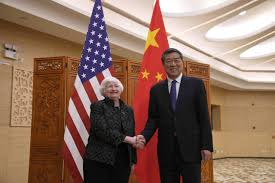After a nearly two-year hiatus, U.S. and Chinese defense officials have resumed discussions on safety measures in the Pacific region, addressing concerns over unsafe encounters between their respective military forces. The renewal of dialogue marks a significant step towards de-escalating tensions and fostering greater cooperation between the two global powers. This article explores the implications of the resumed military talks, analyzes the underlying dynamics shaping U.S.-China relations, and examines the importance of enhanced communication for regional stability.
Navigating Rough Waters: A Brief History of U.S.-China Military Relations The relationship between the United States and China has been marked by a complex interplay of cooperation and competition, particularly in the realm of military affairs. Over the years, both nations have grappled with strategic mistrust, territorial disputes, and differing visions for the Indo-Pacific region. Previous attempts at military dialogue have been derailed by diplomatic standoffs and geopolitical tensions, leading to periods of stagnation in communication channels.
The Disruption of Military-to-Military Contact: Understanding the Catalysts The abrupt suspension of military-to-military contact by Beijing in 2022, following House Speaker Nancy Pelosi’s visit to Taiwan, underscored the fragility of U.S.-China relations. The dispute over Taiwan, a longstanding flashpoint in bilateral ties, has frequently served as a trigger for diplomatic friction and security concerns. Beijing’s decision to sever communication channels reflected its displeasure with perceived U.S. interference in what it considers an internal matter, exacerbating existing strains in the relationship.
Thawing the Ice: Diplomatic Initiatives and Renewed Engagement Efforts to thaw relations gained momentum with the Biden-Xi summit and subsequent high-level engagements, signaling a willingness on both sides to recalibrate their approach. The resumption of military talks, including the China-U.S. Military Maritime Consultative Agreement meeting, demonstrates a shared recognition of the need for dialogue to address operational safety and prevent unintended escalation. These discussions represent a crucial opportunity to build mutual trust and enhance crisis management mechanisms in the Pacific theater.
Navigating Choppy Waters: Addressing Challenges and Opportunities While the resumption of military talks is a positive development, navigating the complexities of U.S.-China relations remains fraught with challenges. Divergent strategic interests, territorial disputes, and competition for regional influence continue to strain bilateral ties, posing obstacles to sustained cooperation. Moreover, the broader geopolitical landscape, including the U.S.’s Indo-Pacific strategy and China’s assertive posture, adds further layers of complexity to the dynamics between the two nations.
Forging a Path Forward: The Imperative of Enhanced Communication and Cooperation Amidst these challenges, fostering open, direct, and clear communication channels between the U.S. and Chinese militaries is paramount for ensuring stability and managing risk in the Pacific region. By engaging in constructive dialogue and transparent exchanges, both sides can mitigate misunderstandings, de-escalate tensions, and prevent miscalculations that could lead to conflict. Additionally, collaborative efforts on common challenges such as maritime security, humanitarian assistance, and disaster relief can serve as confidence-building measures and lay the groundwork for future cooperation.
The resumption of U.S.-Chinese military talks represents a significant milestone in efforts to promote stability and security in the Indo-Pacific. By reengaging in dialogue and addressing mutual concerns, both nations have an opportunity to chart a course towards greater cooperation and understanding. While challenges remain, the renewed commitment to communication underscores the importance of proactive diplomacy in managing complex geopolitical dynamics. As the two powers navigate uncertain waters, sustained dialogue and pragmatic engagement will be essential for building trust, reducing risks, and fostering a more stable and prosperous region.
